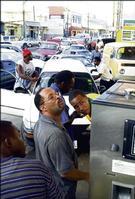Dr. Raymond Wright, Contributor


Motorists line up at a gas station in Kingston. The Petroleum Corporation of Jamaica said that most vehicles can operate satisfactorily with 87 octane gasolene. - RICARDO MAKYN/STAFF PHOTOGRAPHER
It is a myth that higher octane fuels are better for one's vehicle. The logic has been that 90-grade octane is a premium fuel, hence it must be better for the vehicle. In reality, the premium label on 90-grade gasoline originates from the higher cost to refine and improve octane content and the resultant higher retail cost.
MANY PEOPLE believe that a higher octane fuel produces a higher compression, thus improving engine performance. Not really! It depends on the car engine. For about 95 per cent of the cars in Jamaica, 87 octane gasolene is the recommended one. More often than not, using a higher octane gasoline will not improve performance. The higher octane gasolene (90 grade) is only recommended if the car engine knocks (pings) when using 87 fuel.
It is a myth that higher octane fuels are better for one's vehicle. The logic has been that 90-grade octane is a premium fuel, hence it must be better for the vehicle. In reality, the premium label on 90-grade gasoline originates from the higher cost to refine and improve octane content, and the resultant higher retail cost.
Some owners believe that 90-octane gasoline will make their vehicles more powerful. However, only engines with high compression ratios can deliver all the potential energy from 90-grade octane. Generally, engines with compression ratios of 9.3:1 or less will operate efficiently with unleaded 87 octane gasolene. Engines with higher compression ratios may require 90 grade octane fuels. A typical engine for most cars in Jamaica has a compression ratio of approximately 8:1.
WHAT DOES OCTANE MEAN?
The octane rating of gasolene tells you how much the fuel can be compressed before it spontaneously ignites. When gasolene ignites by compression, rather than because of the spark from the spark plug, it causes knocking in the engine; 87 octane gasoline can handle the least amount of compression before igniting.
One way to increase the horsepower of an engine of a given displacement is to raise its compression ratio. So, a 'high performance engine' has a higher compression ratio and requires higher-octane fuel. The disadvantage is that the gasoline (90 octane) for these high performance engines cost more.
FURTHER COMPLICATION IN THE NUMBERS
There are two main ways of expressing the octane rating of gasolene. One is by the research octane number (RON), the other is by a formula of (RON+MON)/2. The fact is that the 87 gasolene that we use in Jamaica, which is based on the formula (RON+MON)/2, is equivalent to 90 RON. Hence, if one looks in a car manual and sees 90 RON, one is likely to conclude that one needs 90 octane at the pump although one only needs 87 octane gasolene.
The fact is that 94 RON is equivalent to 90 octane at the Jamaican gasolene pump, and 90 RON is equivalent to 87 at the pump.
Dr. Raymond Wright is group managing director of the Petroleum Corporation of Jamaica.









